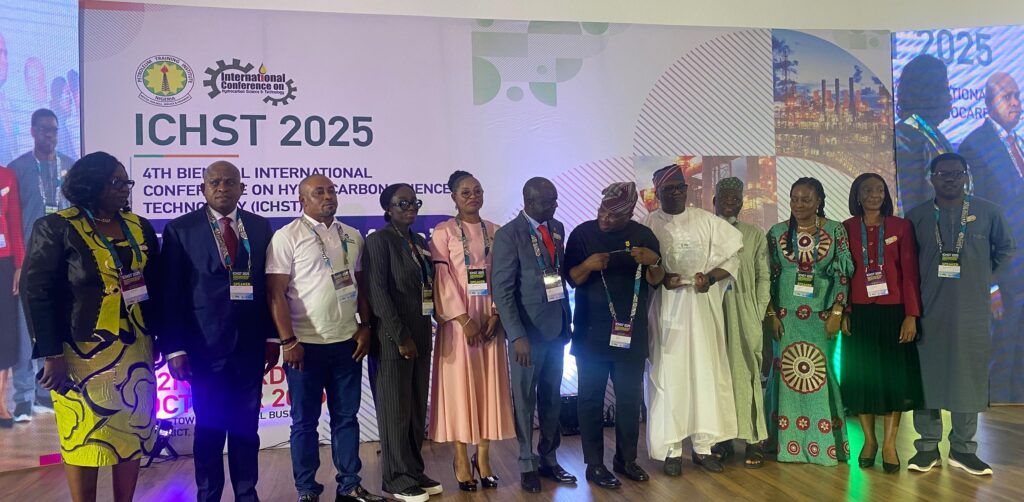By: Goodluck E. Adubazi, Abuja.
At the opening of the 4th Biennial International Conference on Hydrocarbon Science and Technology (ICHST) in Abuja, Engr. Gbenga Komolafe, Chief Executive of the Nigerian Upstream Petroleum Regulatory Commission (NUPRC), delivered a powerful keynote on the theme: “Ethical Governance: The Bedrock of Africa’s Hydrocarbon Future.”
Speaking to industry leaders, policymakers, and international stakeholders at the PTDF Towers, Komolafe laid out a compelling case for why ethical leadership and transparent governance — not just natural resource wealth — will determine Africa’s energy destiny.
“Geology may bless us with resources, and technology may help us unlock them,” Komolafe said. “But only ethical governance will decide whether hydrocarbons become Africa’s curse or its greatest blessing.”
Highlighting the impact of Nigeria’s Petroleum Industry Act (PIA) 2021, Komolafe pointed to transformative progress in formerly neglected oil-producing communities. Under the Host Community Development Trusts (HCDTs) — a legal provision of the PIA — villages once plagued by mistrust are now seeing real benefits: schools under construction, roads being built, and clinics opening.
“These are not acts of charity,” he noted, “but legal entitlements. We are shifting from a history of exclusion to an era of fairness and opportunity — and governance is the bridge.”
Despite Africa’s vast petroleum reserves — over 125 billion barrels of oil and 620 trillion cubic feet of gas — over 600 million Africans still lack access to electricity. Komolafe emphasized that this is not a failure of geology, but of governance.
He called for a new era defined by trust, transparency, and stewardship, crediting President Bola Ahmed Tinubu’s administration for championing a national vision of accountability and reform.
Komolafe cited multiple reforms by the NUPRC that are turning ideals into impact:
25 new regulations developed with civil society and industry to guide licensing, production, and sustainability.
A public register of petroleum concessions, with ownership details and contract terms fully accessible online.
He also praised the 2022 Petroleum Prospecting Licensing Round, calling it the first fully transparent and traceable bidding process in Nigeria’s history, conducted entirely via digital platforms.
“Capital follows credibility,” he said. “Investors don’t just look for reserves — they look for rules that are clear, fair, and consistently applied.”
Nigeria’s transparency drive has catalyzed a major shift in local participation. Indigenous operators now account for over 30% of national oil output, building infrastructure, creating jobs, and managing key assets.
This was made possible, Komolafe stressed, by:
Level playing fields
Transparent data access
Clear fiscal frameworks
Regulatory consistency
The NUPRC has launched an Upstream Decarbonization Framework promoting:
Carbon capture
Gas commercialization
Renewable integration
Backed by digital tools, the commission is reducing manual interference, ensuring data integrity, and strengthening compliance.
“Transparency is not a slogan,” Komolafe said. “It’s a system. A system that protects the environment, earns trust, and drives smarter decisions.”
Nigeria is also championing a pan-African vision. Through the African Petroleum Regulators Forum, the NUPRC is collaborating with counterparts across the continent to promote ethical standards and shared accountability.
This includes supporting the African Energy Bank, a new financial institution that aims to give African nations fair access to capital for energy development — balancing the global decarbonization agenda with Africa’s growth rights.
“We’re not just reforming Nigeria’s governance,” Komolafe declared. “We’re helping reshape Africa’s energy order — one rooted in fairness, transparency, and shared prosperity.”
Komolafe concluded with a resounding message:
“Ethical governance is not optional. It is the foundation upon which trust is built, investment is secured, and prosperity endures. When governance is right, everything else aligns.”
He called for a collective commitment across governments, regulators, operators, and communities to uphold transparency, accountability, and integrity as the true drivers of Africa’s energy future.

